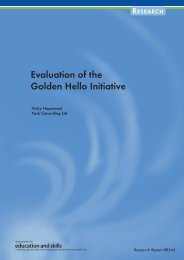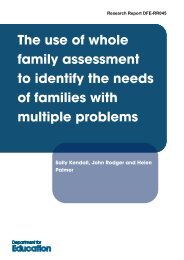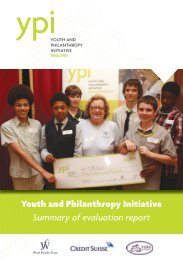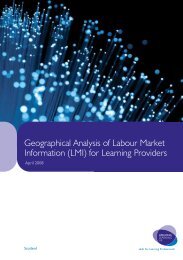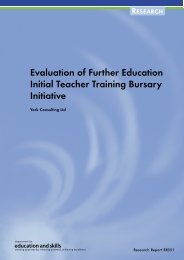Recruitment and Retention in the Post-16 Learning and Skills Sector
Recruitment and Retention in the Post-16 Learning and Skills Sector
Recruitment and Retention in the Post-16 Learning and Skills Sector
You also want an ePaper? Increase the reach of your titles
YUMPU automatically turns print PDFs into web optimized ePapers that Google loves.
Summary7.25 Key issues raised <strong>in</strong> this section relat<strong>in</strong>g to satisfaction, benefits <strong>and</strong>drawbacks are as follows:• a vast majority of respondents (82%) reported that <strong>the</strong>y were ei<strong>the</strong>rfairly or very satisfied with <strong>the</strong>ir present job. Only 10% <strong>in</strong>dicatedexplicit dissatisfaction with <strong>the</strong>ir job. Learn<strong>in</strong>g support workers <strong>and</strong>assessors <strong>in</strong>dicated <strong>the</strong> highest level of satisfaction compared withmanagers <strong>and</strong> teachers/tra<strong>in</strong>ers;• staff work<strong>in</strong>g <strong>in</strong> science, eng<strong>in</strong>eer<strong>in</strong>g <strong>and</strong> ICT subjects were leastlikely to be satisfied with <strong>the</strong>ir current job, compared with thosework<strong>in</strong>g <strong>in</strong> hair <strong>and</strong> beauty <strong>and</strong> retail;• two thirds of respondents (60%) agreed that morale is good with<strong>in</strong><strong>the</strong>ir organisation. Over a quarter of respondents (28%) disagreedthat morale was good;• those with a less positive view of morale were more likely to bework<strong>in</strong>g <strong>in</strong> fur<strong>the</strong>r education, work<strong>in</strong>g <strong>in</strong> science or English,dissatisfied with <strong>the</strong>ir job <strong>and</strong> older;• a quarter of respondents agreed that <strong>the</strong>y do not feel valued <strong>and</strong>recognised for <strong>the</strong> work <strong>the</strong>y do, although 66% of respondentsdisagreed with this statement;• those who are less likely to feel valued <strong>in</strong>clude teachers/tra<strong>in</strong>ers,those work<strong>in</strong>g <strong>in</strong> fur<strong>the</strong>r education colleges <strong>and</strong> those work<strong>in</strong>g <strong>in</strong>science subjects;• <strong>the</strong> most common reasons given for cont<strong>in</strong>u<strong>in</strong>g to work <strong>in</strong> <strong>the</strong> post-<strong>16</strong> learn<strong>in</strong>g <strong>and</strong> skills sector were help<strong>in</strong>g people to develop (51%),job satisfaction/personal achievement (43%) <strong>and</strong> work<strong>in</strong>g withpeople/learners (38%);• <strong>the</strong> key problems that staff face with<strong>in</strong> <strong>the</strong> sector <strong>in</strong>clude too muchbureaucracy <strong>and</strong> a heavy workload.72



